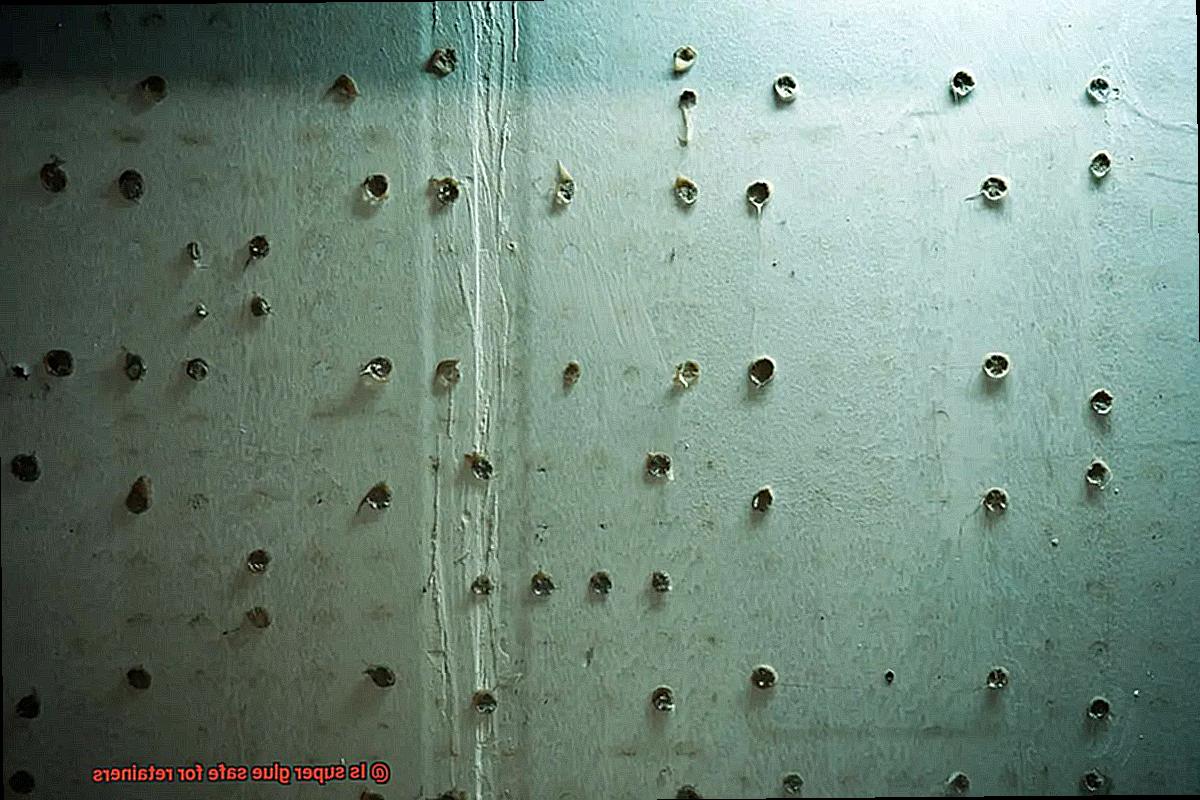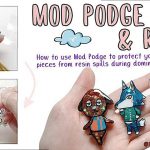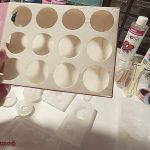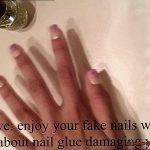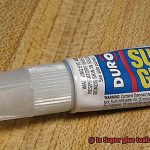Welcome back to our blog, where we dish out practical advice to keep your pearly whites shining bright. Today, we’re tackling a sticky subject – the use of super glue on retainers. You know, those nifty orthodontic devices that keep your smile on point.
Now, we all know how crucial it is to treat our retainers like royalty. But accidents happen, right? Dropping or damaging these delicate appliances is practically inevitable. And in those moments of despair, the idea of whipping out some super glue to fix your broken retainer might pop into your head. But before you reach for that tube of adhesive wonder, let’s take a closer look at whether it’s safe or not.
Sure, the notion of a quick-fix with super glue sounds tempting. But hold up – there could be risks lurking beneath the surface. So join us as we dig deep into the safety concerns surrounding this DIY repair job. We’ll explore potential side effects and alternative solutions that will help you make an informed decision.
(Note: Before you go all MacGyver on your retainer, remember to consult with your trusty orthodontist or dental pro for their expert opinion on adhesive repairs.)
Potential Toxicity of Super Glue
Contents
- 1 Potential Toxicity of Super Glue
- 2 Effect of Super Glue on Retainer Materials
- 3 Limited Durability of Super Glue Bond
- 4 Consult Your Dentist for Professional Advice
- 5 Alternatives to Using Super Glue on Retainers
- 6 Different Types of Dental Adhesives Used for Retainers
- 7 Benefits of Using the Right Adhesive for Retainers
- 8 Safety Considerations When Using Dental Adhesives
- 9 Conclusion
The potential toxicity of super glue when used with retainers is a significant concern. Super glue, also known as cyanoacrylate adhesive, is a fast-acting adhesive that bonds quickly and strongly to various materials. While it is generally safe for many applications, it is important to consider its potential toxicity when using it with retainers.
Super glue contains chemicals that can be harmful if ingested or come into contact with the skin, eyes, or mucous membranes. Ingesting super glue can cause irritation and damage to the gastrointestinal tract, leading to symptoms such as nausea, vomiting, abdominal pain, and difficulty swallowing. Exposure to super glue fumes or vapors can irritate the respiratory system and cause symptoms like coughing, shortness of breath, and throat irritation. Contact with super glue can cause skin irritation, redness, and even chemical burns in some cases. If super glue comes into contact with the eyes, it can cause severe eye irritation and damage, potentially leading to vision problems.
To minimize the risk of toxicity when using super glue on retainers, it is recommended to use non-toxic or medical-grade adhesives specifically designed for dental applications. These adhesives have undergone rigorous testing to ensure their safety for oral use. It is also important to follow proper safety precautions when handling any adhesive. This includes wearing gloves and protective eyewear to minimize skin and eye contact, working in a well-ventilated area to avoid inhaling fumes or vapors from the glue, and keeping the adhesive out of reach of children and pets to prevent accidental ingestion or exposure.
If accidental ingestion or exposure to super glue occurs, it is advised to seek immediate medical attention and provide healthcare professionals with information about the product and its ingredients. Dental professionals should be consulted if any issues arise with retainers to ensure appropriate solutions are provided and dental adhesives that are safe and effective for oral use are used.
Effect of Super Glue on Retainer Materials
Super glue, also known as cyanoacrylate adhesive, is a popular choice for bonding materials due to its strong and fast-acting properties. However, when it comes to using super glue on retainers, there are some potential risks and considerations to keep in mind.
Retainers are typically made from either acrylic or clear plastic, materials that can be sensitive to certain chemicals, including cyanoacrylate. When super glue comes into contact with these materials, it can cause discoloration, cloudiness, or even degradation over time. This not only affects the appearance of the retainer but also compromises its structural integrity.
The extent of the damage caused by super glue can vary depending on factors such as the type and quality of the retainer material, as well as the specific formulation of the super glue used. Some types of super glue may have a milder effect on retainers than others, but it’s generally advisable to avoid using any form of super glue directly on retainers.
Instead, it is recommended to consult with a dental professional if a retainer requires repair or adjustment. Dental professionals have access to specialized dental adhesives that are specifically designed for use with dental appliances. These adhesives are safe for use on retainers and ensure both safety and effectiveness.
Attempting DIY repairs using super glue can lead to further damage or improper alignment, which may necessitate more extensive repairs or even replacement of the retainer. It is best to leave any repairs or adjustments to professionals who have the expertise and knowledge to handle them properly.
Prevention is key when it comes to maintaining the longevity and effectiveness of retainers. Proper care and handling, such as keeping them clean, storing them in a protective case when not in use, and avoiding exposure to excessive heat or chemicals, can help minimize the need for repairs and reduce the risk of accidental damage.
Limited Durability of Super Glue Bond
The limited durability of super glue bonds on retainers can be attributed to several factors, making it an unreliable choice for this application. Firstly, the nature of the materials involved plays a significant role. Super glue is designed to create a strong bond between surfaces, but the plastic or metal surface of retainers may not provide enough surface area for the glue to adhere properly. Consequently, the bond formed is weak and susceptible to breaking or coming loose over time.
Furthermore, the oral environment poses additional challenges for super glue bonds on retainers. The mouth is a dynamic environment, constantly exposed to moisture, saliva, and temperature changes. These factors can compromise the adhesive properties of super glue, leading to a weakened bond between the retainer and the tooth surface. This weakening can result in potential damage or displacement of the retainer.
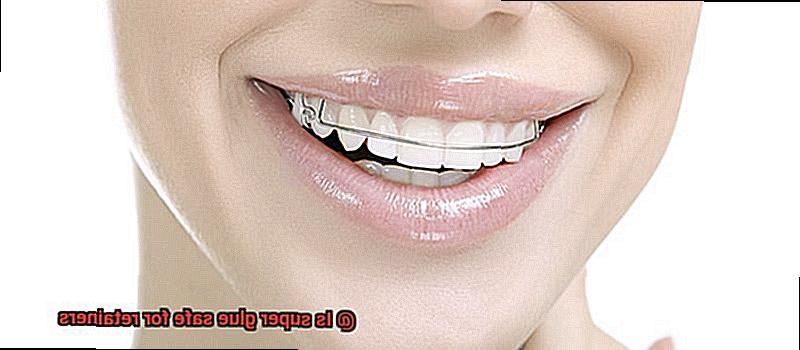
Moreover, dental professionals have access to specialized dental adhesives formulated specifically for use in the mouth. These adhesives are designed to withstand the challenges of the oral environment and provide a more durable bond between the retainer and the tooth surface. It is advisable to consult with a dental professional for any issues with retainers to ensure proper repair and maintenance.
In addition to limited durability, using super glue on retainers can also cause discoloration, cloudiness, and structural damage. These issues compromise both the appearance and functionality of the retainer. To avoid these problems, it is best to rely on safe and effective dental adhesives specifically designed for use with retainers.
Consult Your Dentist for Professional Advice
Consulting your dentist for professional advice is crucial when it comes to the safety and care of your oral appliances, such as retainers. Dentists are trained professionals with a deep understanding of oral health and the materials used in dental appliances. They possess the knowledge and expertise required to provide accurate guidance and recommendations based on your individual needs.
One of the main reasons why consulting a dentist is important is because they have a comprehensive understanding of the specific requirements and properties of different types of retainers. Retainers are custom-made dental appliances designed to maintain the alignment of teeth after orthodontic treatment. Dentists can assess the condition of your retainer and determine if repair or replacement is necessary. They can also provide you with proper cleaning and maintenance techniques to ensure the longevity and effectiveness of your retainer.
Another reason why it is important to consult a dentist is because self-repair attempts using inappropriate adhesives, such as super glue, can have adverse effects on your oral health. Dentists are aware of the potential risks associated with using these adhesives, such as allergic reactions or toxic effects caused by certain chemicals present in super glue. They have access to specialized dental adhesives that are safe, non-toxic, and compatible with oral tissues. Dentists can recommend suitable adhesives based on your individual needs and ensure their proper application.
Seeking professional advice from a dentist also ensures personalized guidance for retainer care. Dentists can address any concerns or questions you may have, providing you with accurate information and recommendations tailored to your specific situation. By consulting a dentist, you can ensure the safety and effectiveness of your oral appliances and maintain optimal oral health.
Alternatives to Using Super Glue on Retainers
Using super glue on retainers is not recommended for several reasons. Firstly, super glue contains chemicals that can be toxic if ingested or come into contact with the skin or eyes. Since retainers are placed in the mouth, there is a risk of these chemicals being released and causing harm. Additionally, super glue can damage the retainer material, leading to further problems and potential discomfort.
Fortunately, there are safer alternatives available for repairing retainers. Here are a few options:
- Dental adhesive: This adhesive is specifically designed for oral use and is safe for contact with the mouth. It is made of non-toxic materials and provides a strong bond to hold the retainer together.
- Orthodontic wax: Orthodontic wax is typically used to alleviate discomfort caused by braces or other orthodontic appliances. However, it can also be used as a temporary fix for retainers until they can be properly repaired or replaced. Simply apply the wax to hold broken or loose parts in place temporarily.
- Professional repair: In some cases, it may be necessary to seek professional help from an orthodontist or dentist specializing in orthodontics. These professionals have the expertise and tools to repair retainers effectively. They can use techniques such as heat welding or laser welding to bond broken pieces together, ensuring a secure and durable repair.
It’s important to note that attempting DIY repairs on retainers, especially with adhesives not specifically designed for oral use like super glue, can lead to further damage or compromise the hygiene of the retainer. It’s always best to consult with a dental professional for proper repair and maintenance of retainers.
Different Types of Dental Adhesives Used for Retainers
When it comes to retaining teeth after orthodontic treatment, dental adhesives play a crucial role in keeping retainers securely in place. There are several types of dental adhesives commonly used for retainers, each with its own advantages and disadvantages. Let’s explore the different types of dental adhesives used for retainers and their unique characteristics.
Firstly, acrylic resin is the most common type of dental adhesive used for retainers. This adhesive provides a strong bond between the retainer and the teeth, ensuring that the retainer stays in place. Not only is acrylic resin safe to use in the mouth, but it also doesn’t cause any harm to the teeth or gums. However, one disadvantage of acrylic resin is that it may not be as aesthetically pleasing as other options.
Another type of dental adhesive used for retainers is composite resin. Similar to acrylic resin, this adhesive creates a strong bond between the retainer and the teeth. However, composite resin has the added benefit of being tooth-colored, making it more aesthetically pleasing. This can be a great choice for individuals who are concerned about the appearance of their retainers.
Glass ionomer cement is another option that some orthodontists may use for retainers. This adhesive releases fluoride, which helps prevent tooth decay. It is often recommended for individuals who are at a higher risk for cavities or have a history of dental problems. The fluoride release property of glass ionomer cement makes it an excellent choice for those who prioritize oral health.
In addition to these options, there are light-cured resin adhesives and chemical-cured resin adhesives available for retainers. Light-cured resin adhesive is applied to the surface of the retainer and then cured using a special light. It provides a strong bond and is easy to apply. On the other hand, chemical-cured resin adhesive is applied to the retainer and then chemically cured, usually by mixing two components together. This type of adhesive is known for its durability and long-lasting bond.
Lastly, silicone-based adhesives are often used for retainers. These adhesives are applied in a thin layer to the surface of the retainer and provide a flexible bond. They are particularly useful for patients with sensitive gums or those who require a more comfortable fit. Silicone-based adhesives offer flexibility and adaptability, ensuring a secure hold without compromising comfort.
It’s important to note that not all dental adhesives are suitable for use with retainers. Super glue, for example, should never be used as it is not designed for oral use and can be harmful if accidentally ingested. Always consult with your orthodontist to determine the most appropriate adhesive for your retainer based on your individual needs and circumstances.
Benefits of Using the Right Adhesive for Retainers
Using the right adhesive for retainers offers a multitude of benefits, ensuring that the retainer stays securely in place, protecting it from damage, prolonging its lifespan, promoting better oral hygiene, and providing peace of mind for both the wearer and their orthodontist.
Firstly, using the correct adhesive prevents the retainer from slipping or shifting, maintaining proper teeth alignment and ensuring its effectiveness. No more worries about a loose retainer causing further misalignment or failing to deliver the desired results.
In addition, the right adhesive safeguards the retainer from damage. Delicate materials like plastic or wire can easily break or warp if not properly cared for. However, with an adhesive specifically formulated for retainers, the retainer remains intact and in pristine condition.
Moreover, using the appropriate adhesive can extend the lifespan of the retainer. By securely attaching it to the teeth, the chances of loss or damage are significantly reduced. This means less frequent replacements, saving both time and money for wearers.
Apart from practical advantages, using the right adhesive promotes better oral hygiene. A securely attached retainer allows for easy cleaning and maintenance, preventing bacteria buildup and reducing the risk of gum disease or other oral health issues.
Lastly, using the right adhesive provides peace of mind. Wearers can confidently go about their daily activities without worrying about their retainer coming loose or falling out. Orthodontists can also rest assured that their patients’ retainers are securely in place.
Safety Considerations When Using Dental Adhesives
Safety considerations when using dental adhesives are crucial to ensure the well-being of individuals and prevent any potential harm or complications. Here are some key points to keep in mind:
- Choose the right adhesive: Use dental adhesives specifically designed for oral use. Regular household super glue or other adhesives may contain harmful chemicals that can pose serious health risks.
- Follow manufacturer instructions: Carefully read and follow the instructions provided by the manufacturer. This includes proper application techniques, recommended amounts to use, and any precautions that need to be taken.
- Perform a patch test: Before applying the adhesive directly to the oral tissues or using it on a dental appliance, perform a patch test. This can help identify any potential allergic reactions or sensitivities to certain components of the adhesive.
- Seek professional dental assistance: Dental adhesives should only be used as a temporary solution. If a dental appliance becomes damaged or loose, it is advisable to seek professional dental assistance for proper assessment and repair.
- Maintain good oral hygiene: Regularly brush, floss, and rinse with mouthwash to prevent the accumulation of bacteria or food particles around the adhesive or dental appliance. This can help minimize the risk of oral infections or other complications.
Conclusion
In conclusion, using super glue on retainers is not recommended due to its potential toxicity, capacity to damage retainer materials, limited durability of the bond formed, and availability of safer alternatives. Super glue contains chemicals that can be harmful if ingested or come into contact with the skin, eyes, or mucous membranes. Swallowing super glue can cause gastrointestinal irritation and difficulty swallowing, while exposure to its fumes or vapors can irritate the respiratory system. Additionally, contact with super glue can result in skin irritation and burns.
Furthermore, applying super glue to retainers can lead to damage of materials such as acrylic or clear plastic, resulting in discoloration, cloudiness, and compromised structural integrity. The bond formed by super glue is not durable enough for the dynamic oral environment, making it an unreliable choice for retaining appliances.

